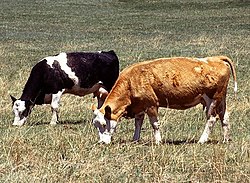You have two cows
From Wikipedia, the free encyclopedia
"You have two cows" is the beginning phrase for a series of political joke definitions.
Contents |
[edit] History
"You have two cows" jokes originated as a parody of the typical examples used in introductory-level economics course material. They featured a farmer in a moneyless society who uses the cattle he owns to trade with his neighbors. A typical example is: "You have two cows; you want chickens; you set out to find another farmer who has chickens and wants a cow". These examples were meant to show the limitations of the barter system, leading to the eventual introduction of currency and money.[citation needed]
The "two cows" parodies, however, place the cow-owner in a full-fledged economic system where cows are used as a metaphor for all currency, capital, and property. The intent of these jokes is usually to point out flaws and absurdities in those systems, although non-political jokes have been derived from them.[1][2][3][4][5]
Jokes of this type attracted the attention of a scholar as early as 1944. An article in The Modern Language Journal discusses the classical ones, such as:[6]
- Socialism: You have two cows. You give one to your neighbor.
- Communism: You have two cows. You give them to the Government, and the Government then gives you some milk.
- Capitalism: You have two cows. You sell one and buy a bull.
- Naziism: You have two cows. The Government shoots you and takes the cows.
Bill Sherk mentions that such lists circulated throughout the country since around 1936 under the title "Parable of the Isms".[7]
[edit] Notable usages
Jokes of this genre formed the base of a monologue by comedian Pat Paulsen on The Smothers Brothers Comedy Hour in the late 1960s. This material was later used as an element of his satirical US presidential campaign in 1968, and was included on his 1968 comedy album Pat Paulsen for President.[8]
Richard M. Steers and Luciara Nardon in their book about global economy use the "two cows" metaphor to illustrate the concept of cultural differences. They write that jokes of this kind:[9]
- Russian company: You have two cows. You drink some vodka and count them again. You have five cows. The Russian Mafia shows up and takes however many cows you have.
- Californian company: You have a million cows. Most of them are illegals.
These are funny because they are realistic caricatures of various cultures, and the pervasiveness of such jokes stems from the significant cultural differences. They further say that others argue that such jokes present cultural stereotypes and must be viewed with caution.
[edit] See also
[edit] References
- ^ Guevarra, Argee (June 4, 1997). "Future Tense: e-jokes" (subscription required). BusinessWorld. ProQuest document ID: 84519297, Source type: Periodical. ISSN 01163930. http://www.proquest.com/. Retrieved on 2006-12-08. "praises the joke and gives versions from various countries/economic systems".
- ^ Melnick, Rick (August 2001). "Bovinus economicus" (subscription required). American Vegetable Grower (Willoughby) 49 (8): 42. ProQuest document ID: 77628668, Source type: Periodical. ISSN 07419848. http://www.proquest.com/. Retrieved on 2006-12-08. "presents the joke".
- ^ "Enronism Avenue Of The Americas [USA edition]". Financial Times (London (UK)): 13. January 10, 2002. ProQuest document ID: 98859339. Source type: Newspaper (subscription required). ISSN 03071766. "adds Enron version of two cows joke".
- ^ (subscription required)Insider Column. Thailand, distributed by Knight Ridder Tribune Business News. Washington: Bangkok Post. January 17, 2002. pp. 1. ProQuest document ID: 100120779 Source type: Wire Feed. http://www.proquest.com/. Retrieved on 2006-12-08. "four new 2 cows jokes relevant to world economic issues".
- ^ Plender, John (April 14, 2003). "Texan bull" (subscription required). Financial Times (London 1st Edition) (London (UK)): 24. ProQuest document ID: 324166071. ISSN 03071766. http://www.proquest.com/. Retrieved on 2006-12-08. "talks about Enron version of joke".
- ^ George A. Henninger, "In Defense of Dictionaries and Definitions", The Modern Language Journal, January 1944, vol. 28, pp.29-39
- ^ "500 Years of New Words", by Bill Sherk, Doubleday, 1983, ISBN 0385179022, p. 162.
- ^ ""Pat Paulsen for President" - album info and review". LiveDaily Store. http://www.livedailystore.com/B000069Z0Y/Pat_Paulsen_for_President.html. Retrieved on 2007-12-18. "...included in this collection: "Two Cows," where the various systems of government are explained with the useful illustration of two cows..."
- ^ Managing In The Global Economy, by Richard M. Steers, Luciara Nardon (2005) ISBN 0765615517


